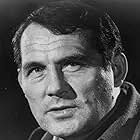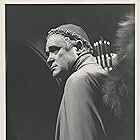IMDb RATING
6.4/10
1.2K
YOUR RATING
The down-at-heel lodger in a seaside boarding house is menaced by two mysterious strangers, who eventually take him away.The down-at-heel lodger in a seaside boarding house is menaced by two mysterious strangers, who eventually take him away.The down-at-heel lodger in a seaside boarding house is menaced by two mysterious strangers, who eventually take him away.
- Awards
- 1 nomination
Storyline
Did you know
- TriviaThe movie was a passion project of director William Friedkin who called it "the first film I really wanted to make, understood and felt passionate about". He had first seen the play in San Francisco in 1962, and managed to get the film version funded by Edgar J. Scherick at Palomar Pictures, in part because it could be made relatively cheaply. Pinter wrote the screenplay himself and was heavily involved in casting. "To this day I don't think our cast could have been improved," wrote Friedkin later.
- Quotes
Stanley Webber: How would you like to go away with me?
Lulu: What?
Stanley Webber: How would you like to go away with me?
Lulu: Where would we go?
Stanley Webber: Nowhere...
Lulu: Well that's a charming proposal.
Stanley Webber: There's nowhere to go, so we could just go, it wouldn't matter.
Lulu: We might as well stay here.
- ConnectionsFeatured in Pinter's Party as Told by William Friedkin (2017)
Featured review
Reportedly the first film William Friedkin directed that he was really, truly excited about, The Birthday Party is an adaptation of Harold Pinter's play of the same name, adapted into a script by Pinter himself. Having never seen a Pinter play or read much of anything about him, I think I can still suss out the meaning of the play's intentions, but I was generally not that engaged by what was going on. The only thing that really kept my interest was Friedkin's ability to find new ways to shoot a very confined space, keeping the film visually interesting from start to finish in a small two-room set that occupies about 95% of the film's runtime.
The film only has six characters. The central character is Stanley (Robert Shaw), a former piano player, currently out of work and spending all of his time in the boarding house he lives in in a seaside town on the English coast. The boarding house is run by Meg (Dandy Nichols) who is married to Petey (Moultrie Kelsall) who reads his newspaper, eats his corn flakes, and wishes for more to eat than corn flakes for breakfast. Being a Pinter play (I assume), there's a lot of talk to set up these characters in their routines, to establish the scene through character actions and dialogue. Essentially, they live a quiet, repetitive life with little excitement, the only real interesting things being the mystery around their boarder, Stanley. Meg decides that that day is his birthday, even though, after he eventually gets down for breakfast, he disagrees, and she's going to throw him a birthday party.
Into this mix come two strangers, McCann (Patrick Magee) and Goldberg (Sydney Tafler). Who they are never becomes clear, though their motives become clear enough as they butt into the little existence with a clear-eyed focus on Stanley. From the moment they enter the scene, they have an obvious motive of breaking Stanley down, but it doesn't become terribly clear why until very late in the film. Essentially, what I can figure out is that Stanley represents a kind of harmless non-conformism that cannot be tolerated, so advocates of conformity come in to clear that up and make him fly straight. He's something of a loser, clinging to half-remembered and perhaps incorrect memories of professional heights from years past. The two break him down by questioning the past, even his very name, and Stanley, being in no good mental shape, is an open target to be harassed and broken down.
It all crescendos at the titular party, the neighbor Lulu (Helen Fraser) having brought a toy drum for Stanley as a present which becomes the central visual motif of the film as it represents his lowered status and even that gets broken in its own way before Stanley himself is completely broken. There is still a half hour of the film left where we get insights into Goldberg, in particular, and Petey standing up slightly for Stanely before being shooed out of the house to deal with some business at the beach.
So, I find it kind of obvious. Most of the character beats are people just talking about themselves in extended soliloquies that never feel natural despite the emphasis on character and realistic setting which are obviously meant for naturalism on some level. The actual action extends into some level of absurdism and surrealism which Friedkin enhances through conscious filmmaking techniques.
Which takes me to Friedkin himself. I don't know what I was expecting when I started going through his work chronologically, but whatever it was, it wasn't going to be actor-focused theatrical adaptations. And yet, that's exactly what I'm getting. What's surprising beyond that is that Friedkin is taking this stage-bound production and really making it feel cinematic. The focus is very much on the actors and their characters, so it's not like our eyes are wandering to the backgrounds and compositions, but that doesn't stop Friedkin from finding new ways to keep his actors in the frame. This has an advantage over something like The Zero Theorem in that there are multiple subjects, so when Friedkin uses something like a camera move from the living room through the window to the kitchen, following two actors as they go and talk, the visual composition is changing, evolving, and continuing to be interesting as he moves from one composition to the next (evoking Wyler to a great degree) while the focus is very much on the two actors.
Those actors are uniformly very good, of course. I always get a kick out of seeing Magee because it makes me think of his performance in A Clockwork Orange, but it's Shaw who's the focus as the broken man broken further by the outside presence intruding upon his little life.
So, it's well-made and it's well-acted, but I just generally can't get into it. I find extended monologues about the self to be less interesting than Pinter does, it seems, and the central point feels both too on the nose and too thin for the running time. Maybe it works better on the stage.
The film only has six characters. The central character is Stanley (Robert Shaw), a former piano player, currently out of work and spending all of his time in the boarding house he lives in in a seaside town on the English coast. The boarding house is run by Meg (Dandy Nichols) who is married to Petey (Moultrie Kelsall) who reads his newspaper, eats his corn flakes, and wishes for more to eat than corn flakes for breakfast. Being a Pinter play (I assume), there's a lot of talk to set up these characters in their routines, to establish the scene through character actions and dialogue. Essentially, they live a quiet, repetitive life with little excitement, the only real interesting things being the mystery around their boarder, Stanley. Meg decides that that day is his birthday, even though, after he eventually gets down for breakfast, he disagrees, and she's going to throw him a birthday party.
Into this mix come two strangers, McCann (Patrick Magee) and Goldberg (Sydney Tafler). Who they are never becomes clear, though their motives become clear enough as they butt into the little existence with a clear-eyed focus on Stanley. From the moment they enter the scene, they have an obvious motive of breaking Stanley down, but it doesn't become terribly clear why until very late in the film. Essentially, what I can figure out is that Stanley represents a kind of harmless non-conformism that cannot be tolerated, so advocates of conformity come in to clear that up and make him fly straight. He's something of a loser, clinging to half-remembered and perhaps incorrect memories of professional heights from years past. The two break him down by questioning the past, even his very name, and Stanley, being in no good mental shape, is an open target to be harassed and broken down.
It all crescendos at the titular party, the neighbor Lulu (Helen Fraser) having brought a toy drum for Stanley as a present which becomes the central visual motif of the film as it represents his lowered status and even that gets broken in its own way before Stanley himself is completely broken. There is still a half hour of the film left where we get insights into Goldberg, in particular, and Petey standing up slightly for Stanely before being shooed out of the house to deal with some business at the beach.
So, I find it kind of obvious. Most of the character beats are people just talking about themselves in extended soliloquies that never feel natural despite the emphasis on character and realistic setting which are obviously meant for naturalism on some level. The actual action extends into some level of absurdism and surrealism which Friedkin enhances through conscious filmmaking techniques.
Which takes me to Friedkin himself. I don't know what I was expecting when I started going through his work chronologically, but whatever it was, it wasn't going to be actor-focused theatrical adaptations. And yet, that's exactly what I'm getting. What's surprising beyond that is that Friedkin is taking this stage-bound production and really making it feel cinematic. The focus is very much on the actors and their characters, so it's not like our eyes are wandering to the backgrounds and compositions, but that doesn't stop Friedkin from finding new ways to keep his actors in the frame. This has an advantage over something like The Zero Theorem in that there are multiple subjects, so when Friedkin uses something like a camera move from the living room through the window to the kitchen, following two actors as they go and talk, the visual composition is changing, evolving, and continuing to be interesting as he moves from one composition to the next (evoking Wyler to a great degree) while the focus is very much on the two actors.
Those actors are uniformly very good, of course. I always get a kick out of seeing Magee because it makes me think of his performance in A Clockwork Orange, but it's Shaw who's the focus as the broken man broken further by the outside presence intruding upon his little life.
So, it's well-made and it's well-acted, but I just generally can't get into it. I find extended monologues about the self to be less interesting than Pinter does, it seems, and the central point feels both too on the nose and too thin for the running time. Maybe it works better on the stage.
- davidmvining
- Jun 6, 2024
- Permalink
- How long is The Birthday Party?Powered by Alexa
Details
- Release date
- Country of origin
- Language
- Also known as
- Harold Pinter's The Birthday Party
- Filming locations
- 7 Eriswell Road, Worthing, West Sussex, England, UK(The boarding house)
- Production companies
- See more company credits at IMDbPro
- Runtime2 hours 3 minutes
- Color
- Aspect ratio
- 1.85 : 1
Contribute to this page
Suggest an edit or add missing content














